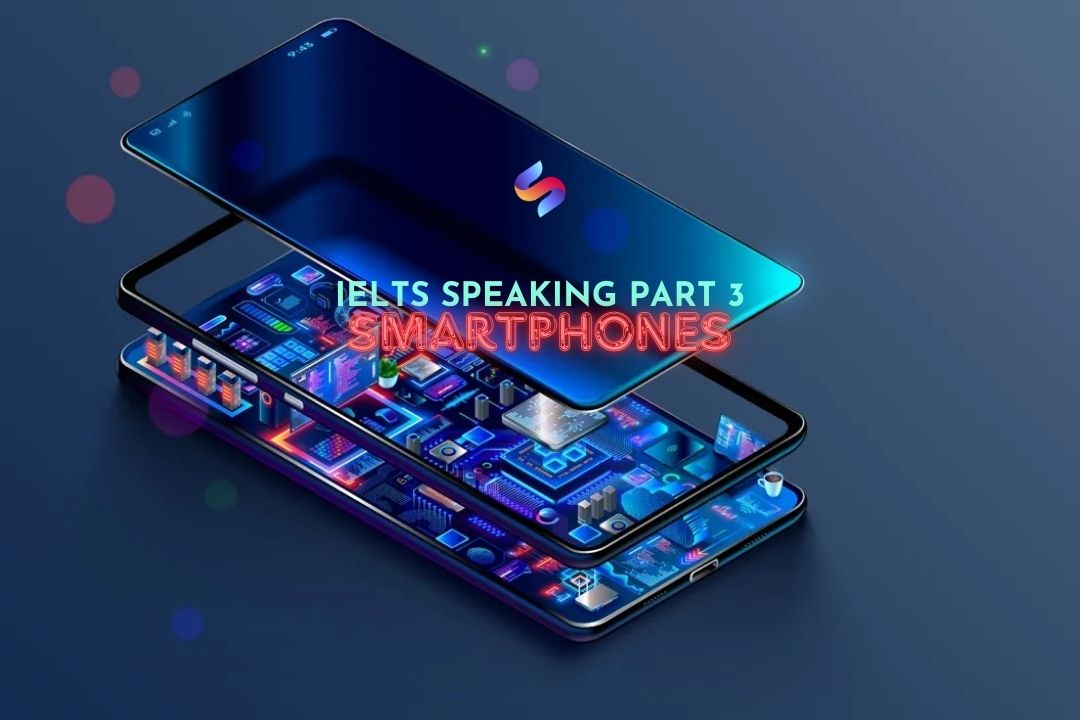Đội ngũ chuyên gia tại Smartcom English là tập hợp những chuyên gia đầu ngành trong lĩnh vực IELTS nói riêng và tiếng Anh nói chung. Với phương pháp giảng dạy sáng tạo, kết hợp với công nghệ AI, chúng tôi mang đến những trải nghiệm học tập độc đáo và hiệu quả. Mục tiêu lớn nhất của Smartcom Team là xây dựng một thế hệ trẻ tự tin, làm chủ ngôn ngữ và sẵn sàng vươn ra thế giới.
Bạn có thể sống thiếu chiếc smartphone không? Thiết bị nhỏ bé này đã trở thành một phần không thể thiếu trong cuộc sống hiện đại của chúng ta. Từ việc kết nối với bạn bè, tìm kiếm thông tin đến giải trí, smartphone đáp ứng hầu hết các nhu cầu của chúng ta. Trong phần thi IELTS Speaking part 3, bạn rất có thể sẽ được hỏi về những tác động của smartphone đối với cuộc sống, xã hội và văn hóa. Vậy làm thế nào để bạn có thể nói về chủ đề này một cách trôi chảy và tự tin? Hãy cùng Smartcom English khám phá những câu hỏi tiềm năng và cách trả lời hiệu quả để đạt điểm cao nhé!

Câu hỏi thường gặp
- When should parents allow their children to have a phone?
- Are there places in your country where phones are not allowed?
- How can phones be disruptive sometimes?
- Do people in your country often switch off their phones?
- Are people often impolite with their phone use?
When should parents allow their children to have a phone?
(Khi nào cha mẹ nên cho phép con cái mình sở hữu điện thoại?)
Parents should allow their children to have a phone when they can show maturity and responsibility, typically around middle school age. At this point, children should understand digital etiquette and be able to manage their screen time. It’s important for parents to establish guidelines and monitor usage to prevent issues like cyber risks and ensure the phone is used effectively. By setting clear boundaries and educating children about online safety, parents can make sure that having a phone is a positive experience.
Dịch câu trả lời: Cha mẹ nên cho phép con cái họ sử dụng điện thoại khi chúng thể hiện được sự trưởng thành và trách nhiệm, thường là vào độ tuổi trung học cơ sở. Vào thời điểm này, trẻ nên hiểu về chuẩn mực đạo đức trong môi trường số và có khả năng quản lý thời gian sử dụng điện thoại. Quan trọng là cha mẹ phải thiết lập hướng dẫn và theo dõi việc sử dụng để tránh các rủi ro trên mạng và đảm bảo điện thoại được sử dụng hiệu quả. Bằng cách đặt ra các giới hạn rõ ràng và giáo dục trẻ về an toàn trực tuyến, cha mẹ có thể đảm bảo rằng việc có điện thoại sẽ là một trải nghiệm tích cực.
Từ vựng lưu ý:
| Word/Phrase | Phonetic Transcription | Word Type | Vietnamese Meaning | Example Sentence |
|---|---|---|---|---|
| maturity | /məˈtʊərɪti/ | noun | sự trưởng thành | Maturity is essential before getting a phone. |
| responsibility | /rɪˌspɒnsəˈbɪləti/ | noun | trách nhiệm | Responsibility includes understanding phone use. |
| middle school age | /ˈmɪdl skul eɪdʒ/ | noun phrase | độ tuổi trung học | Middle school age is often suitable for phone ownership. |
| digital etiquette | /ˈdɪdʒɪtl ˈɛtɪkɛt/ | noun phrase | chuẩn mực đạo đức trong môi trường số | Learning digital etiquette is crucial for phone users. |
| guidelines | /ˈɡaɪdlaɪnz/ | noun | hướng dẫn | Clear guidelines help manage phone use. |
| monitor usage | /ˈmɒnɪtə ˈjuːsɪdʒ/ | verb phrase | theo dõi việc sử dụng | Monitoring usage prevents misuse. |
| cyber risks | /ˈsaɪbər rɪsks/ | noun phrase | rủi ro trên mạng | Cyber risks must be managed carefully. |
| online safety | /ˈɒnlaɪn ˈseɪfti/ | noun phrase | an toàn trực tuyến | Online safety is vital for children with phones. |
Are there places in your country where phones are not allowed?
(Có những nơi nào mà điện thoại không được phép sử dụng ở nước bạn hay không?)
Yes, there are several places in Vietnam where phones are restricted. For instance, hospitals often prohibit phone use in patient care areas to maintain privacy and minimize distractions. Similarly, museums and theaters may enforce phone bans to preserve the integrity of the experience and avoid disruption. These restrictions help create a more respectful environment and ensure that everyone can fully engage in their surroundings.
Dịch câu trả lời: Có, ở Việt Nam có một số nơi mà việc sử dụng điện thoại bị hạn chế. Ví dụ, các bệnh viện thường cấm sử dụng điện thoại ở khu vực chăm sóc bệnh nhân để duy trì sự riêng tư và giảm thiểu sự phân tâm. Tương tự, các bảo tàng và rạp chiếu phim cũng có thể áp dụng lệnh cấm điện thoại để bảo vệ tính toàn vẹn của trải nghiệm và tránh sự gián đoạn. Những hạn chế này giúp tạo ra một môi trường tôn trọng hơn và đảm bảo mọi người có thể hoàn toàn tập trung vào những gì xung quanh.
Từ vựng lưu ý:
| Word/Phrase | Phonetic Transcription | Word Type | Vietnamese Meaning | Example Sentence |
|---|---|---|---|---|
| hospitals | /ˈhɒspɪtəlz/ | noun | bệnh viện | Hospitals often restrict phone use to protect patient privacy. |
| patient care areas | /ˈpeɪʃənt keə əˈrɪəz/ | noun phrase | khu vực chăm sóc bệnh nhân | Phones are banned in patient care areas to avoid distractions. |
| privacy | /ˈpraɪvəsi/ | noun | sự riêng tư | Privacy is crucial in medical settings. |
| distractions | /dɪsˈtrækʃənz/ | noun | sự phân tâm | Phones can cause distractions in sensitive environments. |
| museums | /mjuˈziːəmz/ | noun | bảo tàng | Museums often ban phones to maintain the experience’s integrity. |
| theaters | /ˈθiːətəz/ | noun | rạp chiếu phim | Theaters enforce phone bans to avoid disruption during performances. |
| integrity | /ɪnˈtɛɡrɪti/ | noun | tính toàn vẹn | Preserving the integrity of an experience is essential. |
| disruption | /dɪsˈrʌpʃən/ | noun | sự gián đoạn | Disruption from phones can impact the enjoyment of a show. |
| respectful | /rɪˈspɛktfəl/ | adjective | tôn trọng | Creating a respectful environment is important in public spaces. |
How can phones be disruptive sometimes?
(Điện thoại đôi khi có thể gây phiền phức như thế nào?)
Phones can be disruptive in several ways. Constant notifications and ringtones can interrupt conversations or important events, leading to distraction and decreased focus. In public spaces like theaters or meetings, the noise from a phone can disturb others and detract from the overall experience. Moreover, excessive phone use can lead to social disengagement, where individuals become absorbed in their devices rather than interacting with those around them.
Dịch câu trả lời: Điện thoại có thể gây ra sự gián đoạn theo nhiều cách. Thông báo liên tục và âm thanh chuông gọi có thể làm gián đoạn các cuộc trò chuyện hoặc sự kiện quan trọng, dẫn đến sự phân tâm và giảm tập trung. Ở các không gian công cộng như rạp chiếu phim hoặc cuộc họp, tiếng ồn từ điện thoại có thể làm phiền người khác và làm giảm chất lượng của trải nghiệm. Hơn nữa, việc sử dụng điện thoại quá mức có thể dẫn đến sự tách biệt xã hội, khi mọi người trở nên quá chú ý vào thiết bị của mình thay vì tương tác với những người xung quanh.
Từ vựng lưu ý:
| Word/Phrase | Phonetic Transcription | Word Type | Vietnamese Meaning | Example Sentence |
|---|---|---|---|---|
| constant notifications | /ˈkɒnstənt ˌnəʊtɪfɪˈkeɪʃənz/ | noun phrase | thông báo liên tục | Constant notifications can disrupt meetings and conversations. |
| ring tones | /rɪŋ toʊnz/ | noun phrase | âm thanh chuông gọi | Ring tones often interrupt quiet environments. |
| distraction | /dɪsˈtrækʃən/ | noun | sự phân tâm | Distraction from phones can affect productivity. |
| decreased focus | /dɪˈkriːst foʊkəs/ | noun phrase | sự giảm tập trung | Phones can cause decreased focus during important tasks. |
| public spaces | /ˈpʌblɪk speɪsɪz/ | noun phrase | không gian công cộng | Phones can be disruptive in public spaces like theaters. |
| social disengagement | /ˈsoʊʃəl dɪsɪnˈɡeɪdʒmənt/ | noun phrase | sự tách biệt xã hội | Excessive phone use can lead to social disengagement. |
Do people in your country often switch off their phones?
(Người dân nước bạn có thường xuyên tắt điện thoại không?)
In Vietnam, people generally do not frequently switch off their phones. While many use silent mode or do not disturb settings to avoid interruptions, turning off the phone entirely is less common. This is partly due to the constant connectivity demanded by work and social interactions. However, some individuals may switch off their phones during important meetings or while traveling to avoid distractions and ensure focus.
Dịch câu trả lời: Ở Việt Nam, mọi người thường không hay tắt điện thoại. Trong khi nhiều người sử dụng chế độ im lặng hoặc cài đặt không làm phiền để tránh bị làm phiền, việc tắt điện thoại hoàn toàn ít phổ biến hơn. Điều này phần nào do yêu cầu kết nối liên tục từ công việc và các tương tác xã hội. Tuy nhiên, một số người có thể tắt điện thoại trong các cuộc họp quan trọng hoặc khi du lịch để tránh sự phân tâm và đảm bảo sự tập trung.
Vocabulary Table
| Word/Phrase | Phonetic Transcription | Word Type | Vietnamese Meaning | Example Sentence |
|---|---|---|---|---|
| silent mode | /ˈsaɪlənt moʊd/ | noun phrase | chế độ im lặng | Many people use silent mode to avoid interruptions. |
| do not disturb | /duː nɒt dɪsˈtɜːrb/ | noun phrase | không làm phiền | The “do not disturb” setting helps reduce distractions. |
| constant connectivity | /ˈkɒnstənt kəˌnɛkˈtɪvɪti/ | noun phrase | kết nối liên tục | Constant connectivity is often required for work and social life. |
| important meetings | /ɪmˈpɔːrtənt ˈmiːtɪŋz/ | noun phrase | cuộc họp quan trọng | Phones might be switched off during important meetings. |
| traveling | /ˈtrævəlɪŋ/ | noun | du lịch | Travelers sometimes turn off their phones to avoid distractions. |
| distractions | /dɪsˈtrækʃənz/ | noun | sự phân tâm | Phones are often turned off to minimize distractions. |
Are people often impolite with their phone use?
Yes, in Vietnam, phone use can sometimes be considered impolite. For instance, using phones during social gatherings or in public transport can be seen as a lack of etiquette and disrespect towards others. Many people fail to recognize the importance of maintaining social boundaries, leading to interruptions in conversations and a diminished overall experience. Despite this, there is a growing awareness about mindful phone use and the need for better social manners in various settings.
Dịch câu trả lời: Có, ở Việt Nam, việc sử dụng điện thoại đôi khi có thể bị coi là bất lịch sự. Ví dụ, sử dụng điện thoại trong các buổi tụ họp xã hội hoặc trên phương tiện giao thông công cộng có thể được xem là thiếu phép tắc ứng xử và sự thiếu tôn trọng đối với người khác. Nhiều người không nhận ra tầm quan trọng của việc duy trì ranh giới xã hội, dẫn đến việc bị làm gián đoạn các cuộc trò chuyện và giảm chất lượng trải nghiệm chung. Mặc dù vậy, ngày càng có nhiều nhận thức về việc sử dụng điện thoại có ý thức và nhu cầu cải thiện cách ứng xử xã hội trong các tình huống khác nhau.
Từ vựng lưu ý:
| Word/Phrase | Phonetic Transcription | Word Type | Vietnamese Meaning | Example Sentence |
|---|---|---|---|---|
| impolite | /ˌɪmpəˈlaɪt/ | adjective | bất lịch sự | Using phones inappropriately can be seen as impolite. |
| social gatherings | /ˈsoʊʃəl ˈɡæðərɪŋz/ | noun phrase | các buổi tụ họp xã hội | Phones during social gatherings can disrupt interactions. |
| public transport | /ˈpʌblɪk ˈtrænspɔːrt/ | noun phrase | phương tiện giao thông công cộng | Phone use on public transport can be seen as inconsiderate. |
| etiquette | /ˈɛtɪkɛt/ | noun | phép tắc ứng xử | Proper etiquette includes not using phones in certain situations. |
| disrespect | /ˌdɪsrɪˈspɛkt/ | noun | sự thiếu tôn trọng | Phone use can be perceived as a form of disrespect. |
| social boundaries | /ˈsoʊʃəl ˈbaʊndriz/ | noun phrase | ranh giới xã hội | Respecting social boundaries is important for polite interactions. |
| mindful phone use | /ˈmaɪndfəl foʊn juːz/ | noun phrase | việc sử dụng điện thoại có ý thức | Mindful phone use helps in maintaining respect in social settings. |
| social manners | /ˈsoʊʃəl ˈmænərz/ | noun phrase | cách cư xử xã hội | Social manners include being aware of phone use in public. |
Xem thêm: IELTS Speaking part 3: Friendship (Từ vựng & bài nói mẫu)
Để đạt được điểm cao trong phần IELTS Speaking Part 3 chủ đề Smartphones, bạn cần kết hợp giữa kiến thức về chủ đề, khả năng sử dụng ngôn ngữ và kỹ năng giao tiếp. Hãy tự tin thể hiện bản thân và tận hưởng quá trình làm bài thi! Chúc bạn thành công!
Nếu bạn đang phân vân nên học IELTS ở đâu để được hướng dẫn bài bản các kỹ thuật này, hoặc đang tìm hiểu về chi phí học IELTS, thì Smartcom English chính là lựa chọn đáng cân nhắc. Với đội ngũ giảng viên bản ngữ cùng các cựu du học sinh dày kinh nghiệm, Smartcom cam kết đồng hành cùng bạn chinh phục mục tiêu IELTS một cách hiệu quả và tiết kiệm.
Kết nối với mình qua
Bài viết khác

![[PDF + Audio] Tải Sách IELTS Cambridge 19 (Kèm đáp án)](https://smartcom.vn/blog/wp-content/uploads/2024/06/ielts-cambridge-19_optimized.png)



![[PDF + Audio] Tải Sách IELTS Cambridge 17 (Kèm đáp án)](https://smartcom.vn/blog/wp-content/uploads/2024/07/sach-ielts-cambridge-17_optimized.jpg)
![[PDF + Audio] Tải Sách IELTS Cambridge 15 (Kèm đáp án)](https://smartcom.vn/blog/wp-content/uploads/2024/07/ielts-cambridge-15_optimized.jpg)








